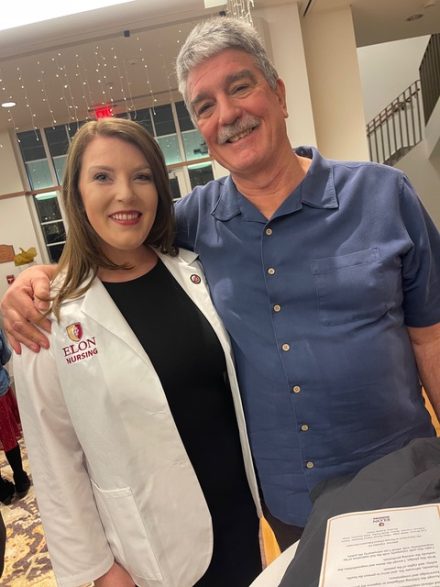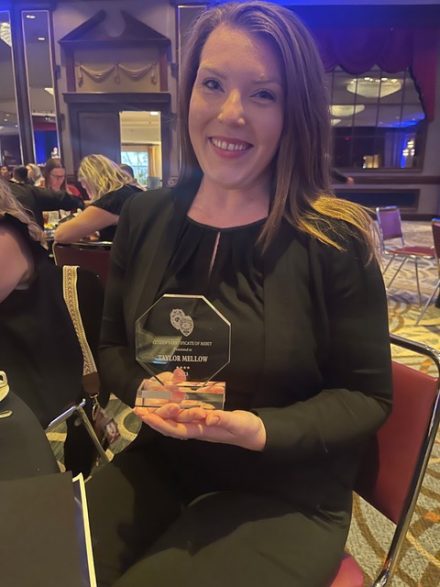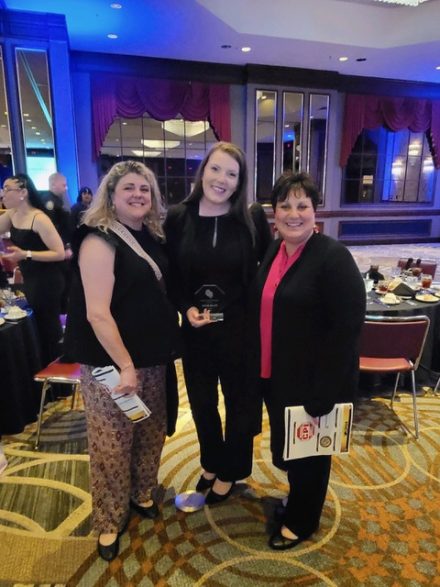Mellow, who is on track to graduate in December with her bachelor’s degree in nursing, received the Citizen’s Award from the Greensboro Police Department for her efforts to save a driver following a wreck.
As an Elon nursing student, Taylor Mellow wondered how she would respond in those instances when life is on the line, when life could quickly slip away.
On the night of March 13, she found out.
A member of the current cohort of Elon’s Accelerated Bachelor’s of Science in Nursing program, Mellow reacted quickly and confidently to begin offering CPR to the driver who crashed his SUV in front of Mellow’s Greensboro home after suffering a medical emergency. Medical personnel credit Mellow with helping keep the man alive so he could be transported to the hospital and receive further life-saving care. Her actions that night would earn her the Citizens Certificate of Merit from the Greensboro Police Department, which honored her in May as part of the Police & Community Annual Banquet held in partnership with the Guilford Merchants Association.

“I feel like it’s solidified the fact that I am meant to be a nurse,” Mellow said. “This experience showed me that I can do this.”
More than a year ago, Mellow was far from the Summit Avenue curb where she would help save a life. Living in California, she was searching for a nursing program outside the state, where the number of applications for nursing programs far outpace the number of seats for future nurses. She had broadened her horizons and was beginning to look all around the country for programs. Elon, which launched its ABSN program in 2021, was the first one that got back to her.
Conversations with Associate Professor of Nursing Tiffany Morris, the inaugural chair of Elon’s Department of Nursing, helped assuage concerns about joining a relatively new program, as did the 100 percent passage rate for the inaugural ABSN cohort on national nursing licensure exams. Mellow learned from Morris that the program focuses not just on delivering the clinical knowledge and skills future nurses will need, but also awareness and insight into the roots of health inequities within the population and pathways to addressing them.
“Dr. Morris has done a wonderful job of creating a program that is really focused on health equity and that is exactly what I was looking for in a nursing program,” Mellow said. “I said, ‘I’m going to go ahead and take this leap of faith, and I’m really glad I did.”
Elon’s ABSN program is tailored for students who have already completed a bachelor’s degree and delivers an intensive curriculum of academic and clinical work across 16 months. Mellow’s bachelor’s degree is in global studies with a focus in social, political and economic development. Much of her study focused on systemic racism and its impact on underserved populations.
She wants to channel that knowledge and passion into health care, and serves as chair of the School of Health Sciences Student Diversity, Equity and Inclusion Committee. “This is my niche,” she said. “I can advocate for my patients, I can look at their care through the lens of equity, and this is how I can make my difference.”

Mellow has already made a difference as a health care provider with her actions on that March night. It was about 9 p.m. and Mellow was making a snack after returning home after housesitting for a week. Summit Avenue is a crowded and busy street, and Mellow and her wife had previously joked that their car was likely to get wrecked while parked along Summit. That was her first thought when she heard a massive crash outside.
She rushed outside to find that an SUV had struck her truck head-on and pushed it back about 25 yards. Investigators would later say they thought it was traveling about 45 to 50 miles per hour at the time of impact. The driver of the truck was partially obscured by deployed airbags and was slumped forward. After knocking on the window and hearing no response, Mellow said a short prayer and opened the driver’s door.
She unsuccessfully tried to get a response from him, and told a bystander to call 911. While talking to a dispatcher, the pulse she had initially been able to find disappeared. With help, she was able to get him out of the truck and began chest compressions.
“I had been CPR-certified for more than a year, but this is the first time I’ve done compressions on a real person,” Mellow said.
After performing compressions for about three minutes, Mellow was relieved when a police officer arrived and was able to give her a break. Emergency medical technicians arrived and were able to revive his heart using a defibrillator. “The cool thing is that EMS never pushed me out of the way,” Mellow said. “They let me be right there with him, and I actually got to feel him come back.”
The doctor on duty in the emergency room that night would later tell police that the person who started compressions on the man saved his life. Providing that bridge from the accident to when emergency medical technicians could begin administering care was critical.
Mellow has since told the story many, many times, and she says when she does, her mind goes to the work that nurses do day in and day out that has monumental and at times life-saving impact on their patients, but who may not receive recognition for their efforts. She thinks ahead to how she will draw on this experience when she is a nurse and will have to assist with “running a code” (administering emergency life-saving care as a team in a hospital).

“I am proud of myself, but I still have to keep that humility and that sense of being humble,” she said. “This is going to become very normal and I have to get into that mindset.”
In early May, she learned she would be one of seven Greensboro residents to be honored by the police department at the Police & Community Awards Banquet for life-saving actions during the past year. Joining her for the celebration were not just her wife and mother-in-law, but two Elon professors from the Department of Nursing – Assistant Professor Jeanmarie Koonts and Assistant Professor Stacey Thomas.
Looking past graduation, Mellow is focused on becoming a critical care nurse who serves in a hospital intensive care unit. It was a role that used to intimidate her due to the serious medical conditions patients in the ICU were dealing with that could be life-threatening. Mellow says she is very empathetic and has had overwhelming responses in the past when confronted with the death of someone close to her. She wasn’t sure how she would react when faced with the possibility of a patient dying in her care.
But now she knows she can be there for her patients and draw upon her knowledge and skill to provide them with the care they need even in the most challenging circumstances. Her wife told her after that night in March, she watched Mellow and was amazed at how she stayed calm and laser-focused on assisting the driver of the truck.
“I wasn’t sure I could do it, but now I know I can,” Mellow said. “I can and will do hard things.”


